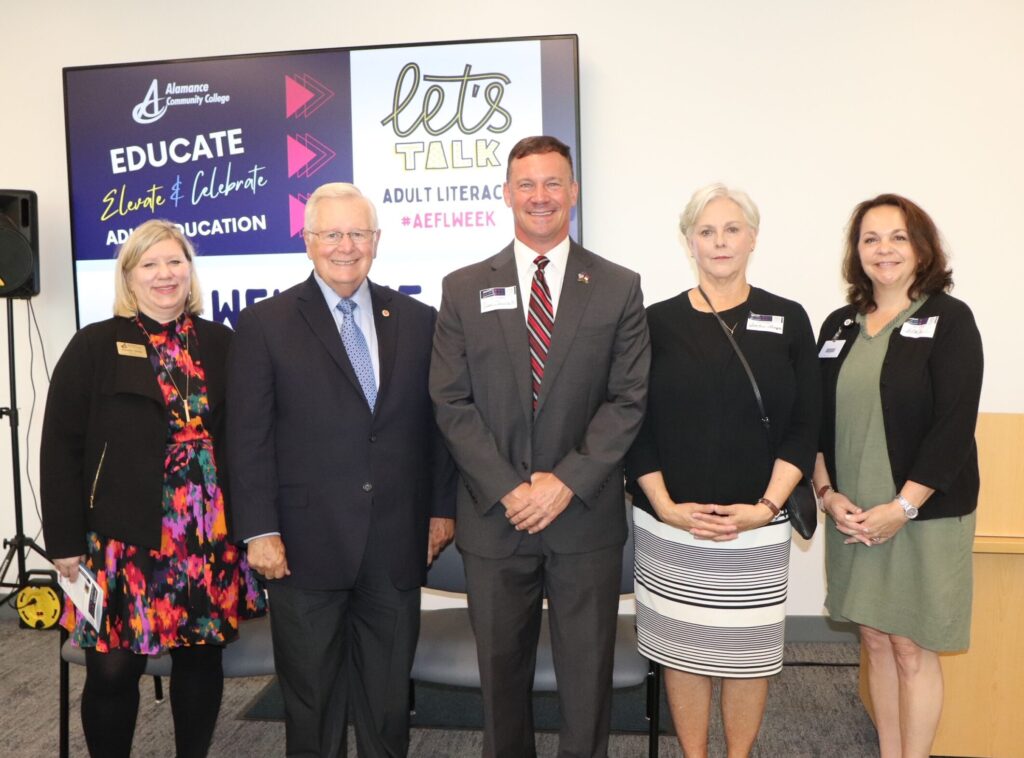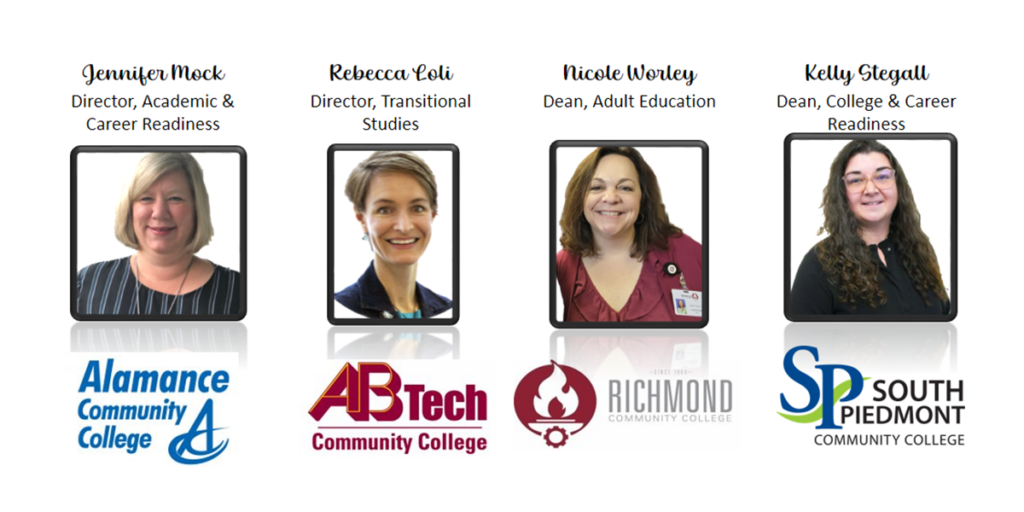Submitted by:
Nicole Worley, Dean of Adult Education, Richmond Community College
Kelly Stegal, Dean of College & Career Readiness, South Piedmont Community College
Jennifer Mock, Director of Academic & Career Readiness, Alamance Community College
Rebecca Loli, Director of Transitional Studies, A-B Technical Community College
At their recent NCCCAEA conference session, Rebecca Loli of A-B Technical Community College, Jennifer Mock of Alamance Community College, Kelly Stegall of South Piedmont Community College, and Nicole Worley of Richmond Community College stressed the importance of advocating for Adult Education programs and encouraged attendees to seek out opportunities to talk about their programs. There is an increased need for Adult Education nationwide. Here in North Carolina, an increased focus on Adult Education programs is needed to help meet the myFutureNC goal of helping 2 million adults obtain a quality, industry-recognized credential by 2030.
Many College and Career Readiness (CCR) programs are seeing the increased demand first-hand at a time where federal mandates have increased and resources to support Adult Education have decreased.
According to the Coalition on Adult Basic Education (COABE), “Over the last decade, declining state and federal funds have led to declining numbers of adult learners who can access services.” In fact, of the 44 million adults in the U.S. with low basic skills, only 1.5 million of them are served by federally-funded Adult Education programs.
There is much transition happening in CCR across North Carolina and many new CCR Directors in the field. We need to do all we can to support one another, especially our colleagues new to CCR. The presenters urged adult educators to seek out a seat at the table to ensure their programs are given more than casual consideration but inclusion when major decisions pertaining to their programs and students are being made.
 Alamance Community College held a Pre-AEFLA Kick Off inviting CCR students, the college, community partners, local legislators, and system office staff to raise awareness about the assets of adult learners. The event included a gallery walk where student success stories highlighted the impact of Adult Education on their lives. “The outcomes have been very positive. Not only have we increased understanding about what adult education is, we were contacted by a local employer about creating training and hiring opportunities for our IDD population,” shared Mock.
Alamance Community College held a Pre-AEFLA Kick Off inviting CCR students, the college, community partners, local legislators, and system office staff to raise awareness about the assets of adult learners. The event included a gallery walk where student success stories highlighted the impact of Adult Education on their lives. “The outcomes have been very positive. Not only have we increased understanding about what adult education is, we were contacted by a local employer about creating training and hiring opportunities for our IDD population,” shared Mock.
“Too busy to go to campus events? Too busy to share your students’ stories? Failing to advocate has a hidden cost,” said Loli from AB-Tech. Don’t get stuck in a state of exasperation or overwork. Your mindset will influence how you act, and your daily actions can change your circumstances! Take the time to develop relationships with colleagues in HR, IT, Advising, Recruiting, the Business Office, and your other WIOA partners like the local workforce development board. When you ask for support, they will feel good about helping you and your students. An easy way to help policy makers understand the return on investment for adult education is to share COABE’s Adult Education Alumni Study survey with your graduates.
https://coabe.org/adult-education-alumni-study/
Kelly Stegall shared how South Piedmont Community College’s transition to a One College model positively impacted adult education. “Throughout this transition, advocacy for the School of College and Career Readiness has been on-going. Since CCR program processes and procedures do not always align with credit or other non-credit programs, it has been necessary to determine where to align staff, supports, and policy, and where it is most appropriate to keep these separate.” While that might sound counter-productive to the institution moving to a pure One College model, it is important to weigh what is in the best interest of CCR programs and students against what is in the best interest of the College.
Throughout this process, we have:
- Accomplished increased collaborations with front door and support services to mitigate barriers to enrollment and persistence for CCR students;
- Accepted oversight of the College’s Testing Services, thus eliminating duplication of services and more effectively managing testing specific to CCR student performance measures;
- Increased collaborative pathway options to encourage transitions;
- Increased CCR staff presence on internal teams; and
- In an effort to achieve parity pay, increased part-time instructor pay by 63 percent since 2018. Current pay scales are approximately 20 percent below adjunct instructor pay rates. Increases are expected year-over-year until parity pay is reached.
As North Carolina’s first COABE State Advocate for Adult Education Fellowship (SAAEF) recipient, Nicole Worley shared her experience with SAAEF and urged CCR Directors to consider applying for next year’s cohort. For more information about COABE, SAAEF, or guidance on how to start the process of adult education advocacy within your local community, feel free to reach out to Nicole Worley at ndworley@richmondcc.edu; Kelly Stegall, kstegall@spcc.edu; Jennifer Mock, jlmock496@alamancecc.edu; or Rebecca Loli, rebeccasloli@abtech.edu.


